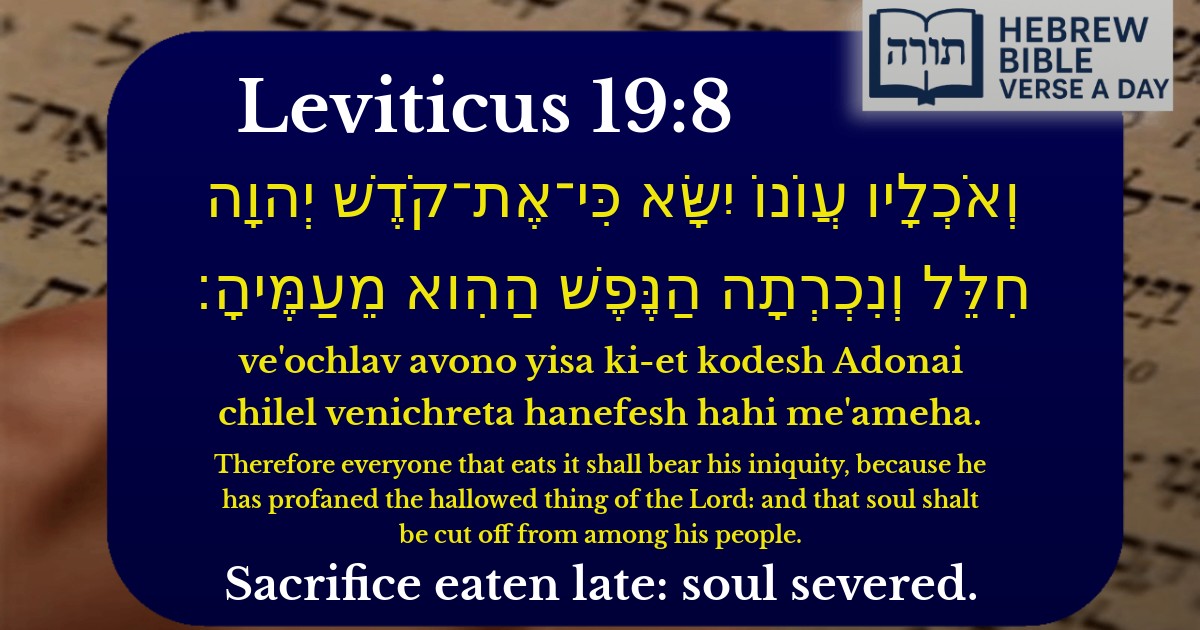Join Our Newsletter To Be Informed When New Videos Are Posted
Join the thousands of fellow Studends who rely on our videos to learn how to read the bible in Hebrew for free!
Hebrew Text
וְאֹכְלָיו עֲוֺנוֹ יִשָּׂא כִּי־אֶת־קֹדֶשׁ יְהוָה חִלֵּל וְנִכְרְתָה הַנֶּפֶשׁ הַהִוא מֵעַמֶּיהָ׃
English Translation
Therefore everyone that eats it shall bear his iniquity, because he has profaned the hallowed thing of the Lord: and that soul shalt be cut off from among his people.
Transliteration
Ve'ochlav avono yisa ki-et kodesh Adonai chilel venichreta hanefesh hahi me'ameha.
Hebrew Leining Text
וְאֹֽכְלָיו֙ עֲוֺנ֣וֹ יִשָּׂ֔א כִּֽי־אֶת־קֹ֥דֶשׁ יְהֹוָ֖ה חִלֵּ֑ל וְנִכְרְתָ֛ה הַנֶּ֥פֶשׁ הַהִ֖וא מֵעַמֶּֽיהָ׃
וְאֹֽכְלָיו֙ עֲוֺנ֣וֹ יִשָּׂ֔א כִּֽי־אֶת־קֹ֥דֶשׁ יְהֹוָ֖ה חִלֵּ֑ל וְנִכְרְתָ֛ה הַנֶּ֥פֶשׁ הַהִ֖וא מֵעַמֶּֽיהָ׃
🎵 Listen to leining
Parasha Commentary
📚 Talmud Citations
This verse is quoted in the Talmud.
📖 Keritot 2a
The verse is cited in a discussion about the severity of eating consecrated food in a state of impurity and the consequences of such actions.
📖 Yoma 73a
Referenced in the context of discussing the laws of atonement and the seriousness of profaning sacred things.


Context of the Verse
This verse appears in Vayikra (Leviticus) 19:8, within the broader discussion of the sanctity of kodshim (holy offerings) and the severe consequences of misusing them. The Torah emphasizes that consuming sacrificial meat improperly—such as beyond its designated time—constitutes a desecration of holiness and incurs severe punishment.
Explanation of the Key Terms
Halachic Implications
The Sefer HaChinuch (Mitzvah 144) elaborates that this prohibition reinforces the principle of kedushas ha’korbanos (sanctity of offerings). Since sacrifices are dedicated to Hashem, their misuse demonstrates contempt for divine service. The punishment of kareis underscores the severity of treating holy matters with negligence.
Moral and Spiritual Lessons
The Sforno comments that this verse teaches the broader concept of respecting boundaries in avodas Hashem (divine service). Just as one may not overstep the permitted time for eating sacrifices, so too must one approach all mitzvos with discipline and reverence. The Midrash Tanchuma (Tzav 14) adds that holiness requires vigilance—failure in this regard leads to spiritual detachment from the community.